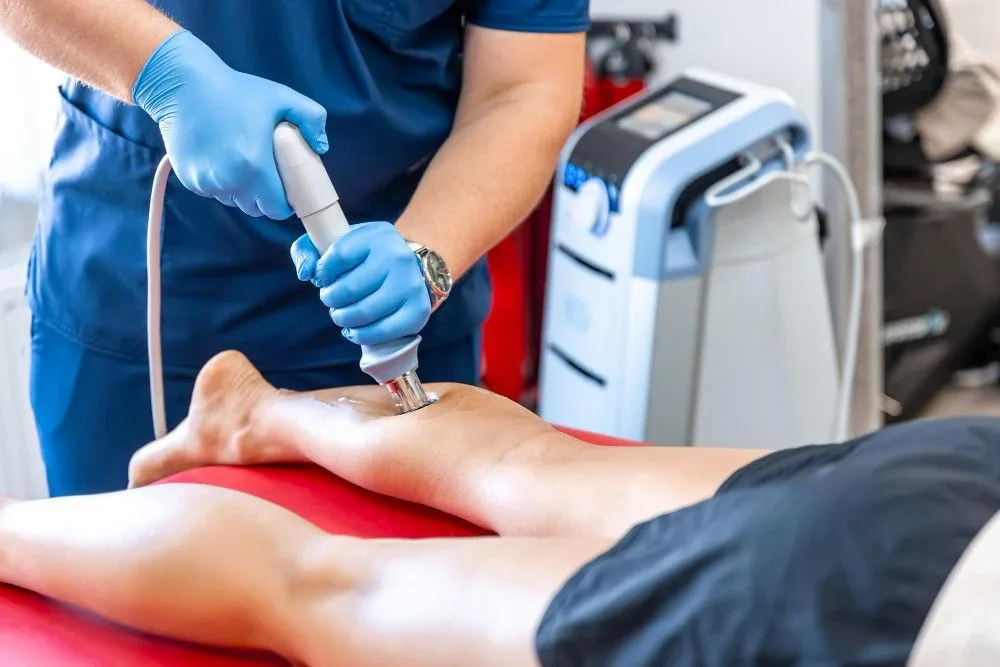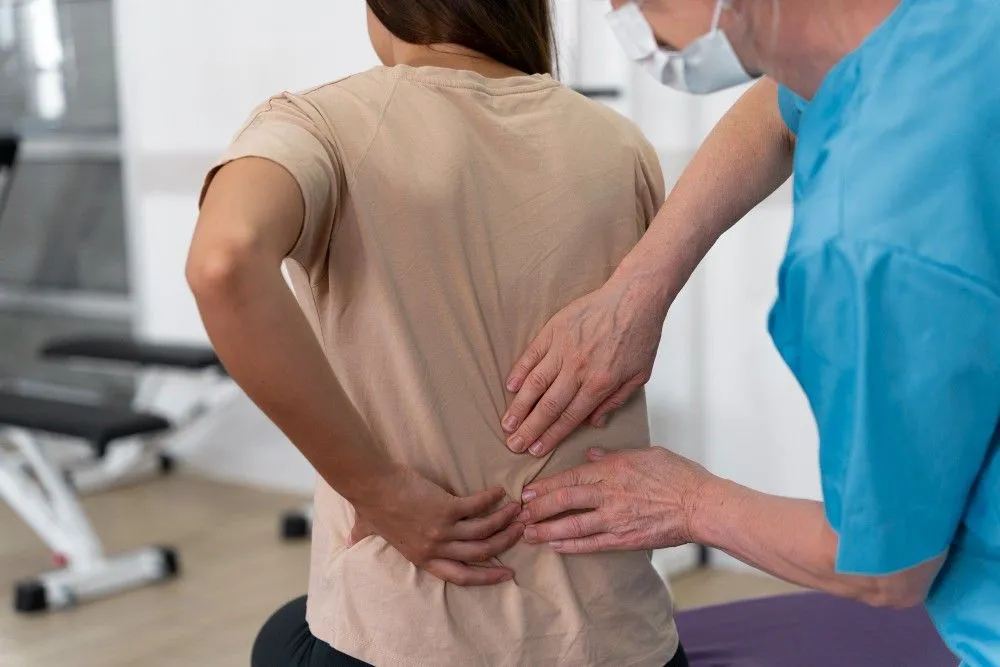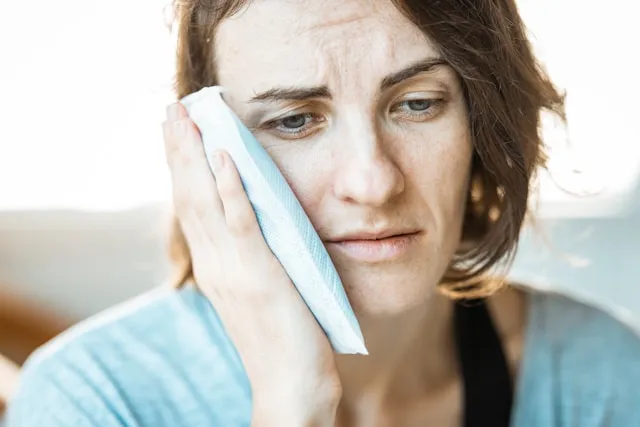Have you ever felt an unexpected ache in your lower back, without lifting anything heavy or sitting awkwardly? While poor posture, injury, or overuse are common culprits, there’s a lesser-known cause many overlook: dehydration.
Yes, being dehydrated can hurt your back, literally. In this article, we’ll unpack how fluid loss can mess with your spinal health, amplify pain sensitivity, and trigger muscle issues. We’ll also guide you on how to spot dehydration-related back pain, manage it, and know when it’s time to call the doctor.
Can Dehydration Cause Back Pain?
Short answer: Yes, it can. Your spine relies heavily on water to function properly, and when your body runs low on fluids, it can start to impact your discs, joints, muscles, and nerves.
Let’s break it down how it happens:
1. Disc Desiccation: Spinal Discs Lose Their Cushion
Spinal discs function as cushions between all the spinal vertebrae, which are responsible for absorbing shocks and easing muscle movement.
These discs are made of around 80% water, and when they lack enough water, they tend to shrink and lose their ability to provide a cushioning effect. This causes increased back pain.
Long-term dehydration can contribute to degenerative disc disease or worsen conditions like herniated discs.
2. Muscle Cramps and Spasms
Muscles, especially in your back, depend on proper hydration and electrolyte balance to contract and relax smoothly.
Dehydration can cause imbalances in sodium, potassium, magnesium, and calcium, making your back muscles more prone to cramps and spasms.
These spasms can be painful, sudden, and often mistaken for injury.
3. Reduced Joint Lubrication
Your joints are coated with synovial fluid, a lubricant that reduces friction between bones.
By lowering the release of synovial fluid, dehydration lowers the lubrication of the joints.
The decrease in this fluid causes extreme friction between the two bones, leading to pain and stiffness along with low mobility.
4. Increased Pain Sensitivity
When you're dehydrated, your nervous system doesn’t operate at full capacity:
Neurotransmitter function falters, making your body more sensitive to pain.
You may feel aches more intensely than usual, even with minimal movement.
How to Tell If Your Back Pain Is Caused by Dehydration
Common Signs:
If you're dehydrated and experiencing back pain, you might notice:
Dull and sharp pain along with stiffness in the lower back, especially after physical activity
Muscle cramps and spasms
Extreme pain that increases with activity or movement
Radiating or shooting pain in the legs (often mistaken for sciatica)
Numbness or tingling sensation in the legs
Changes in bowel or bladder movements
Trouble controlling reflexes in the legs
Reduced flexibility and increased stiffness in the spine
Combined with classic dehydration symptoms like:
Dry mouth, chapped lips, or dry skin
Dark yellow or concentrated urine
Fatigue or lightheadedness
Constipation
Headaches or irritability
Loss of appetite, confusion, or sunken eyes
Quick Tip: If your back pain improves noticeably after rehydrating, that’s a strong clue that dehydration was a trigger
Who’s Most at Risk of Developing Dehydration-Related Back Pain?
While anyone can experience dehydration-related back pain, certain people are more vulnerable:
Athletes or gym-goers who sweat heavily
Older adults, who often have a reduced thirst response
Outdoor workers or those living in hot, humid regions
People who drink lots of caffeine or alcohol (both are diuretics)
Desk workers who forget to hydrate consistently
How to Prevent & Manage Dehydration to Protect Your Back
Here are the tips to manage dehydration and prevent the risk of back pain:
1. Drink Enough Water Regularly
Aim to drink at least 8-9 glasses of water (adjusted for body weight, climate, and activity level) throughout the day, especially in hot weather and during or after workouts.
Increase intake during exercise or when you're sick.
2. Avoid Excessive Caffeine and Sugary Drinks
Limit the use of caffeinated and sugary beverages, as they have diuretic properties, which can increase urination, leading to dehydration. If consuming, compensate with extra water.
3. Consider Electrolytes
Include coconut water, oral rehydration salts (ORS), or electrolyte-rich fruits (bananas, oranges, watermelon).
Add a pinch of Himalayan salt and lemon to water for a quick boost.
4. Limit Intake of Alcoholic Beverages
A study reports that consuming alcoholic beverages can increase the production of urine, as they are diuretics. This can cause the body to lose excessive fluid, resulting in dehydration. So, take it in moderation or avoid it.
5. Consume Hydrating Foods
Eat water-dense fruits and vegetables such as watermelon, oranges, cucumber, spinach, cantaloupe, and celery.
6. Be Cautious of Your Environment:
When it's humid or hot weather, increase your fluid intake. If you are exercising outdoors, take a break in a shady and cool place, and wear loose-fitting and light-colored clothes to regulate body temperature.
7.Make Water Easy to Access
If you don't like walking up to drink water multiple times while you're at work or exercising, the best idea is to carry a reusable bottle with you every time. This can help you assess your water anytime you need it.
8. Set Water Reminders
Set an alarm to drink your water consistently, like with meals or during work breaks, or after exercise. This ensures you maintain your hydration levels.
9. Check your Urine Color Always
Pale yellow = Hydrated
Dark yellow = Dehydrated
Brownish = Severely dehydrated (seek medical help)
10. Infuse Flavor If Needed
If you find drinking water boring and flavorless, try adding lemon, mint, cucumber, or berries for a refreshing twist that encourages you to drink more.
Treatment Options for Dehydration-Triggered Back Pain
If hydration isn’t enough, combine fluid intake with these approaches:
1. Using Heat & Cold Therapy & Over-the-Counter Relief
One of the common natural remedies for back pain is heat and cold therapy.
Apply an ice pack or heating pad to the affected area for about 15 to 20 minutes at a time to relieve muscle spasms and inflammation.
Take OTC pain medications like ibuprofen to reduce pain and inflammation, and OTC gels and creams containing capsaicin or menthol to alleviate localized pain.
2. Stretching & Posture Correction
Gentle yoga stretches like:
Cat-Cow Stretch
Knee-to-Chest
Child’s Pose
Pelvic Tilts
Strengthen your core muscles and improve posture to reduce spinal strain.
3. Professional Help:
Get chiropractic care, which involves managing misalignments between the spine and nearby tissues, enhancing nerve function, and relieving inflammation.
Physical therapists create custom rehab plans to relieve chronic pain and restore flexibility.
When to See a Doctor?
If your back pain doesn’t improve with hydration and self-care, consult a doctor, especially if you experience:
Severe or worsening pain
Fever, numbness, or tingling in the legs
Trouble walking, loss of bladder/bowel control
Confusion or persistent dizziness
Dehydration may be one contributing factor to back pain, but other severe conditions like osteoarthritis, herniated discs, muscle strains, traumatic injury, endometriosis, etc., can also be involved. Seeking medical attention can help with an accurate diagnosis and a treatment plan.
Final Thoughts
So, can dehydration cause back pain? Yes, it can, and it’s more common than you might think, especially when spinal discs do not get enough hydration and dry out, muscles spasm, and nerves misfire, your back can pay the price.
The solution is: Hydrate smartly and consistently. Don’t wait until you’re thirsty. Prevention is easier (and cheaper) than treatment. But if pain persists even after improving hydration, see a doctor to rule out more serious issues.
Related Read: Can Constipation Cause Back Pain
वारंवार विचारले
Where does your back hurt with dehydration?
Back pain is often felt in the lower back area because of the impact of dehydration on spinal muscles and discs. The pain can vary from a dull ache to sharp and localized pain, which can radiate to the legs.
What drink will hydrate you the fastest?
Oral rehydration solutions, such as Liquid I.V. or Pedialyte, hydrate you the fastest. This is because they are loaded with several electrolytes that help with quick water absorption compared to water alone.
How long does it take to rehydrate?
It depends on the severity of dehydration. Mild dehydration can be managed within a few hours, and severe cases take many days.
Which fruit hydrates the most?
Watermelon is the hydrating fruit that hydrates the body the most, as it contains about 92% water. Other highly water-dense fruits are cantaloupe, oranges, strawberries, grapefruit, and peaches.
What can be mistaken for dehydration?
It can be mistaken for electrolyte imbalances, heat stroke, menopause, hypothyroidism, concussion, and anemia, as these conditions mimic the dehydration symptoms. Hence, accurate diagnosis is crucial.
-User-1754377709.png)
लिहिलेले







